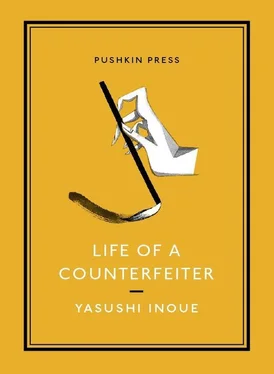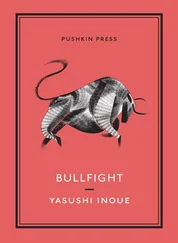Extremely unclear directions of this nature had been written out over three pages, followed by entries giving the recipes for “safflower powder” and “chrysanthemum powder,” with the required quantities of gunpowder for each marked in red ink. The remainder of the book contained entries on preparing “Crossette Comets,” “Straight Bursts,” “Double Leaves,” and so on. Hōsen had intended these notes as memos to himself, of course, and since I knew nothing about fireworks it was all quite beyond me. A piece of hanshi paper that had been tucked between the pages, however, turned out, when I opened it up, to be Hōsen’s résumé. This interested me greatly, though for reasons unrelated to the contents. I say this because, while the presence of Hōsen’s birthday at the beginning—“Hara Senjirō (Hōsen), b. October 3, 1874”—unmistakably identified the résumé as Hōsen’s own, the entries, transcribed in tiny characters, were obviously all fake. “1916–Arareya Fireworks Store, Tokyo; 1918–Suzuki Fireworks Emporium, Yokosuka; 1921– Overseer Tōyō Fireworks Factory; 1922–Sakai Fireworks Emporium, Osaka; 1924–Overseer Marudamaya Fireworks Factory, Osaka”—so they went. At the end of the list, Hōsen had added, in a rather ostentatious fashion: “With reference to the above, all this is confirmed as being free from error.”
There was no way of knowing when and to whom Hōsen had intended to submit this résumé, but the years he had listed, all during the Taishō era, corresponded to the period when he had been roving around Hyōgo and Okayama prefectures, from one small city to the next, peddling his Keigaku counterfeits. Clearly, then, this résumé was a complete fabrication. Perhaps at some point, finding himself unable to make a living either from his forgeries or as a local painter, he had tried to find employment as the chief technician at some fireworks factory. One might go further and imagine that, when he was called in by the police that one time, he used this same fraudulent résumé to pull the wool over his questioners’ eyes, and had managed as a result to escape unscathed.
At any rate, this piece of paper revealed in the plainest possible manner the essence of Hara Hōsen. Of this there could be no doubt.
“This isn’t the sort of thing you would have any experience with, I’m sure, but the truth is it’s extremely unpleasant working with gunpowder in winter… the niter gives you such a chill, so icy cold you can’t even describe it.”
Hara Hōsen’s widow held her right hand out as she spoke, glancing at her palm as if it were a mirror, as if recalling how chapped her skin had been. This was the year the war ended, in late November.
Even now that the fighting was over, life in the city remained shrouded in tremendous uncertainty and confusion, and lately each day’s newspaper carried another article about an armed raid, so until recently I had been planning to have my family stay in our house in the village until New Year’s; the seasons turned a full month earlier there than elsewhere, though, and, by the end of September, dreary, desolate winds had begun barreling up the mountain slopes several times a day, forming a ferocious corridor of wind that blew straight through from Mimasaka to Hōki, and then in October the showers that are such a unique feature of winter in the mountains began sweeping past, one after another — the first indication that the coldest season was approaching.
Around this time, my wife seemed suddenly to have grown afraid of spending winter snowbound in an unfamiliar region, and when I went to visit in early October she informed me, out of the blue, that she wanted to leave as soon as possible. She wasn’t sure she could see my elderly mother and our two children through winter here, without even a heater, and if the children were to catch pneumonia there would be no doctor to take them to… After I returned to Osaka, my wife kept harping on about the same points in every one of her letters, trying to persuade me that they should come back.
In the middle of November, I took a somewhat long vacation to go help my family move out of our mountain village in Tottori prefecture; by the time I had disposed of the assorted difficulties that arose in connection with having our things transported and shipped off and so on and had finally got all the arrangements made, bringing me at last to the point where I was ready to lead my family away, only a few days remained before the end of the month.
On the appointed date, I set out in the afternoon for the train station in Shōyama — a town whose name I had heard but which I had yet to visit — to ship our belongings home on the San’in line. I knew the station master at the next stop, the one at the summit where I always got on and off, and things would undoubtedly have gone much more smoothly if I could have sent everything off from there, but the route was made too difficult for a move by the peaks between the house and the station.
The various negotiations relating to our luggage at Shōyama Station ended up being less involved than I had expected: the man I spoke with told me that if I could wait until evening a truck would be going out to the village where we lived. Walking nearly eight kilometers of mountainous road for the second time in a day seemed like more trouble than I wanted to take, so I decided to hitch a ride on the truck instead.
As I was wondering how to kill the two hours left until then, I suddenly remembered hearing that Hōsen’s widow lived here with her brother. I had no reason to visit the woman, I realized, but then it was always possible she might have some small anecdote to share that related, not so much to Hōsen himself, but to Ōnuki Keigaku, about whom I would eventually have to write my biography, and so I decided to go and see her after all, in part as a way to pass the time.
I managed to track down Hōsen’s wife right away by asking at the general store outside the station. Until two or three years ago the woman, Asa, had run a small candy shop across the way, but as the war escalated she ran out of sweets to sell and decided to close it; she wasn’t working now, and relied for her food and lodging on the generosity of her elder brother, who had a lumber yard or some such thing. So I was told. And so it came about that I went and met Asa on the veranda of a house with quite an imposing demeanor, though I doubted the family had much money.
Naturally I had no way of discerning whether it was a blessing or a misfortune for her to be living with her brother’s family, but she was neatly dressed; she sat on the narrow veranda, basking in the late afternoon sun, peeling persimmons with a kitchen knife, presumably to hang from the eaves to dry. The owner of the sake distillery in Wake had described her, long ago, as petite but beautiful, and it was true: you could tell she had been gorgeous when she was young, and even now there was a cool, sophisticated sort of briskness in both her speech and her bearing that reminded me of the women you find at clubs or restaurants, and seemed unexpected in a women now in her sixties. And yet when she turned her head to the side, I was struck by the thinness of her earlobes, which gave an impression of poverty, and suggested, somehow, that her life had not in fact been happy. I had expected that she might decline to talk about Hōsen, since he had lived and died as a fraud, a painter of counterfeits, but she gave no indication that this was the case.
“I believe when he was young he was friends with Master Keigaku, but after I married him — well, I suppose he may have gone to see the Master at his house in Hyakumanben when he visited Kyoto, but their relationship wasn’t what you would call a friendship. After all, there was that unbelievable period in his life when he made those forgeries, so he couldn’t face the man.”
Читать дальше












